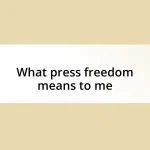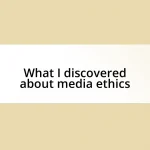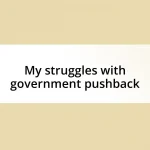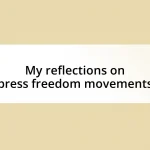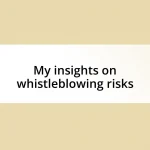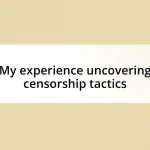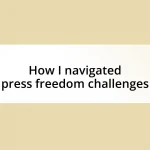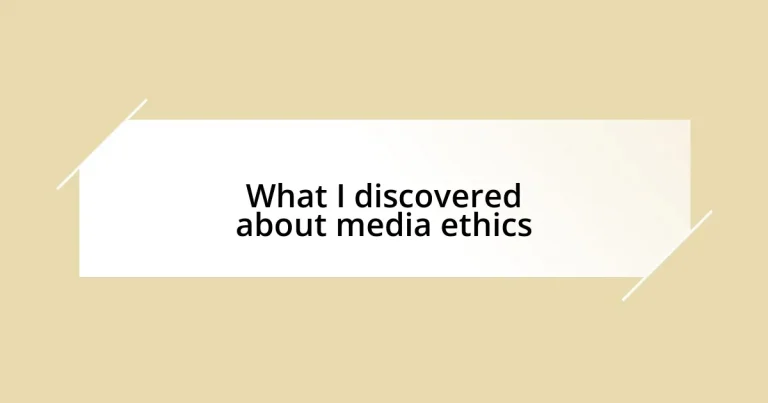Key takeaways:
- Media ethics encompass principles like accuracy, fairness, and transparency, essential for building public trust and accountability.
- Key ethical dilemmas include the balance between privacy and the public’s right to know, conflicts of interest, and the pressure for sensationalism.
- Ethical journalism involves careful language, providing context, and prioritizing accurate reporting, which significantly impacts audience trust and engagement.
- Future trends in media ethics will likely emphasize transparency, inclusivity, and the challenges posed by emerging technologies like AI in journalism.
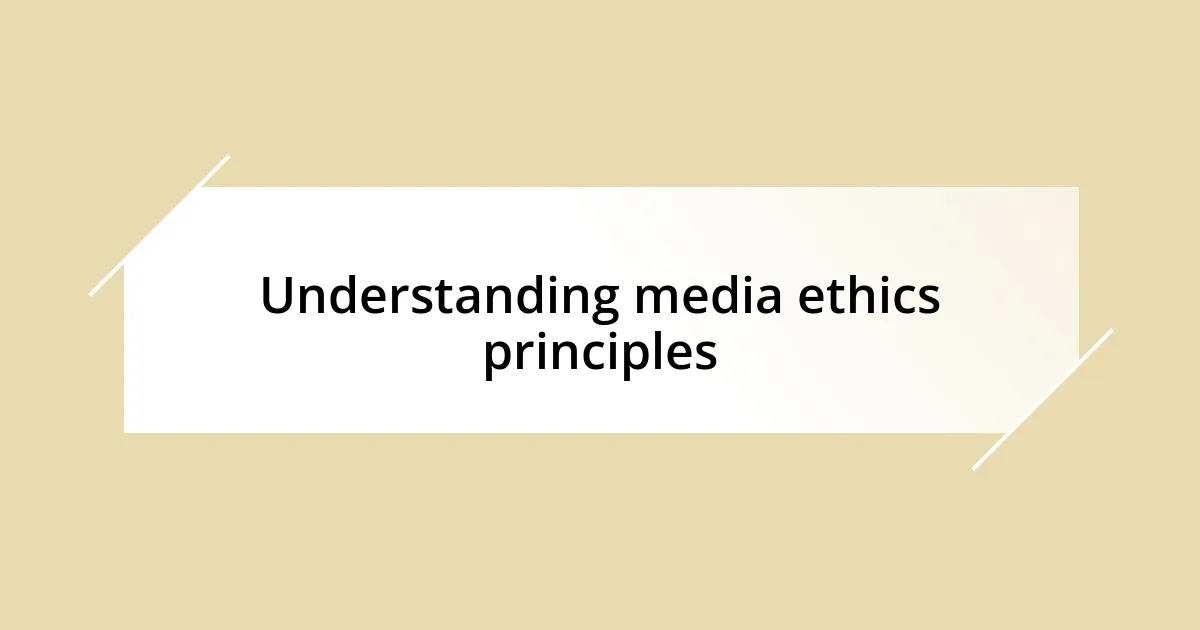
Understanding media ethics principles
Understanding media ethics principles goes beyond just memorizing a set of rules. It’s about grappling with the implications of our choices as communicators in a world saturated with information. I remember a time in a college journalism class when we debated whether publishers should disclose their financial backers. It struck me then how transparency isn’t just a principle; it shapes public trust and accountability.
One of the core principles of media ethics is accuracy. Striving for the truth not only fosters credibility but also demonstrates respect for the audience. I’ve seen the repercussions firsthand when information is misrepresented or sensationalized. It makes me wonder—how many relationships between media and the public are strained because of a single careless error?
Another critical principle is fairness. I’ve found that approaching stories with impartiality can be challenging, especially when personal biases creep in. Reflecting on my early experiences as a reporter, I often asked myself: am I representing all sides of the story? This self-awareness fosters greater integrity in storytelling and promotes a more informed and engaged audience.
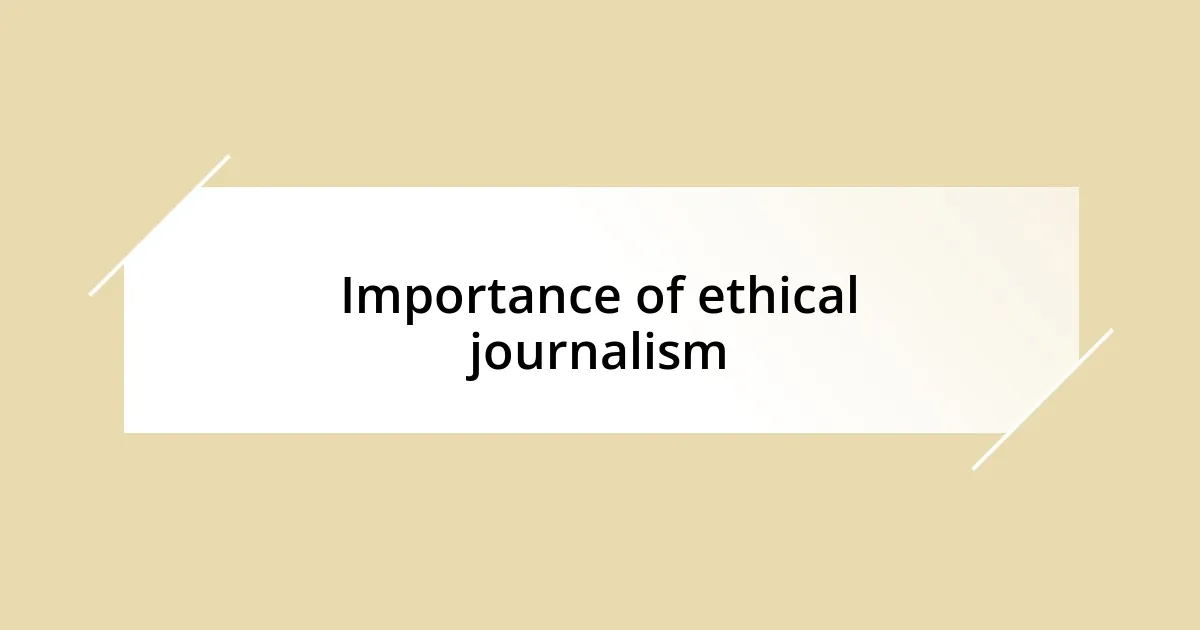
Importance of ethical journalism
Ethical journalism is vital in maintaining the public’s trust. I remember covering a local event once, and as I sifted through various sources, the temptation to sensationalize was strong. Yet, I learned that choosing careful language and sticking to the facts reinforced my credibility. This approach is crucial, as it shapes how the audience perceives not only the story but also the media itself.
Here are a few key reasons why ethical journalism matters:
- Trust Building: Ethical practices foster a bond between the media and the public, encouraging honest communication.
- Accountability: By adhering to ethical standards, journalists hold themselves accountable for their reporting, mitigating the risk of misinformation.
- Balanced Perspectives: Ethical journalism ensures diverse viewpoints are represented, enriching the public discourse.
- Public Informed: Through responsible reporting, journalists can contribute to an informed society, which is essential for democracy.
Reflecting on my journey, I realize that ethical journalism isn’t merely a professional obligation; it’s a commitment to the community. It’s about leaving a legacy of truth-telling that can resonate across generations.
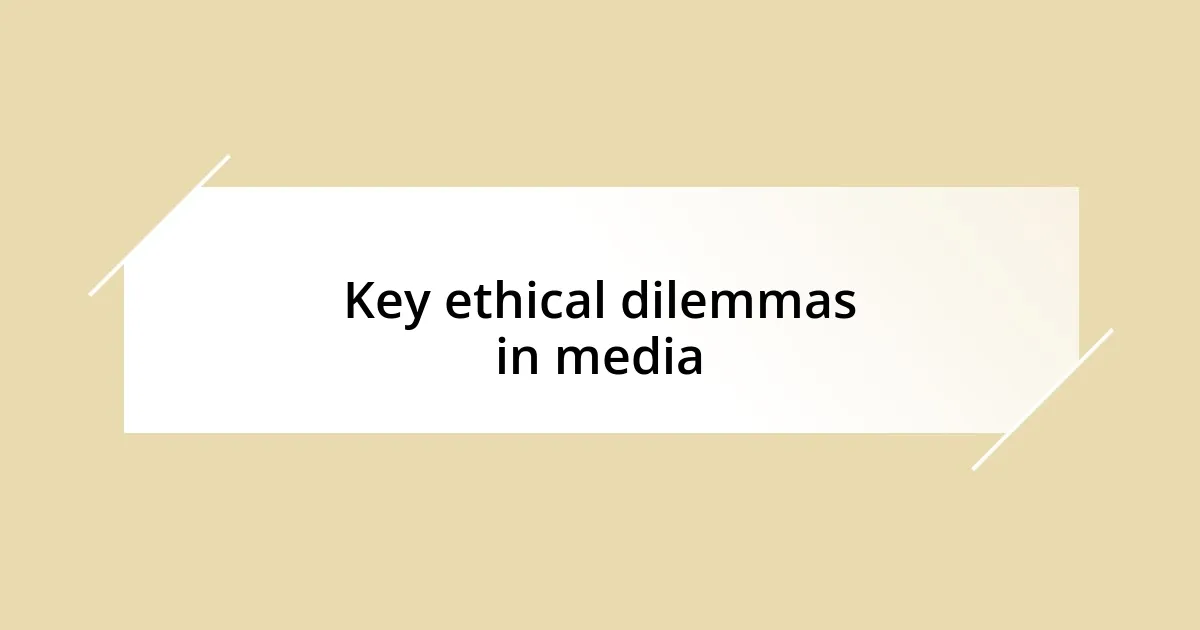
Key ethical dilemmas in media
The media landscape is often fraught with ethical dilemmas that can challenge even the most seasoned journalists. One dilemma that stands out to me is the balance between privacy and the public’s right to know. I’ve experienced this tension firsthand while reporting on sensitive community issues; choosing to respect an individual’s privacy can sometimes mean omitting critical information that the public deserves. It’s a weighty decision that constantly requires me to reflect on the broader implications of my reporting.
Another prevalent ethical dilemma involves conflicts of interest. I vividly recall being part of a project where a corporation sponsored our coverage. The moment it was disclosed, I felt this knot in my stomach—what if my objectivity was compromised? This experience reinforced the idea that transparency is vital. When journalists are upfront about potential biases, we not only uphold our integrity but also empower our audience to interpret reports through an informed lens.
The pressure for sensationalism is also a significant concern. I had a close brush with this when covering breaking news. There was a moment when a more dramatic headline seemed tempting; however, I resisted, knowing it could mislead the audience. It’s these ethical choices that shape our responsibility to deliver truthful, precise reporting while resisting the allure of sensationalism, steering us toward a more engaged and enlightened public.
| Ethical Dilemma | Description |
|---|---|
| Privacy vs. Public Right to Know | The conflict between respecting individual privacy and fulfilling the public’s need for crucial information. |
| Conflicts of Interest | Situations where personal or financial interests may compromise the integrity of reporting. |
| Sensationalism | The pressure to exaggerate or dramatize news stories for audience engagement. |
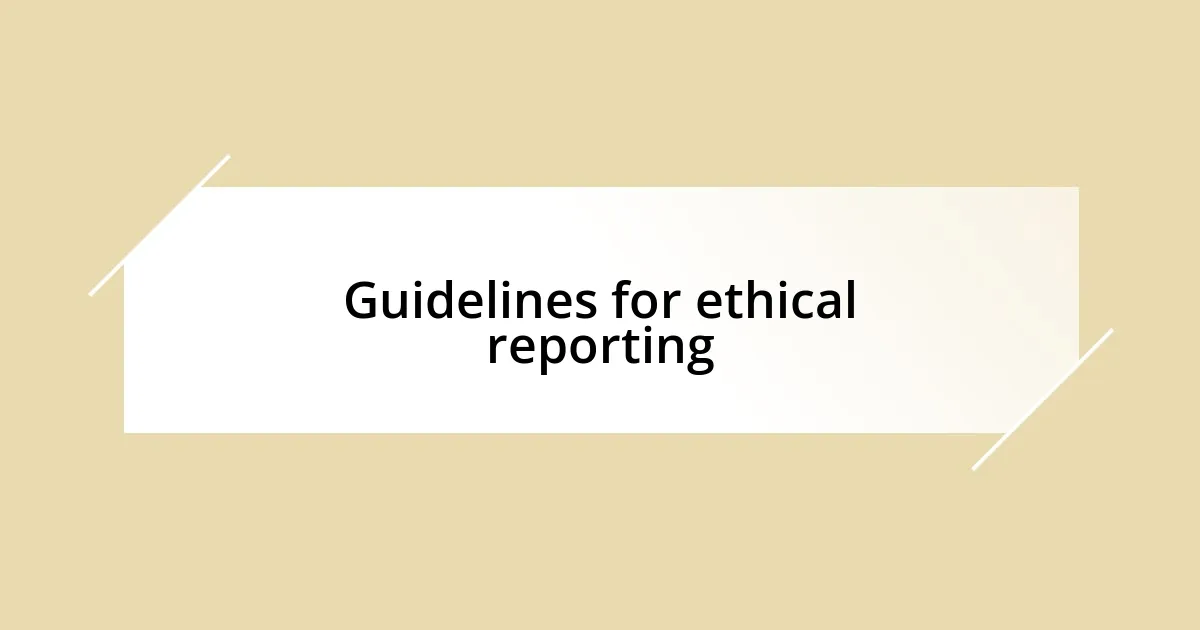
Guidelines for ethical reporting
When it comes to ethical reporting, I always prioritize the accuracy of information. I remember a time when I was covering a controversial topic, and a source provided me with a statistic that seemed unbelievable. Instead of rushing to publish, I took a moment to verify the fact through multiple reputable sources. That experience taught me how essential it is to cross-check information—after all, one misleading detail can erode the trust of the audience I strive to serve.
Having been in the field, I’ve come to appreciate the significance of context. I once reported on a protest without delving deeper into the reasons behind it. Readers responded with confusion, questioning why the protest was happening at all. This taught me that ethical reporting is not just about telling what happened but also about giving readers the full picture. Shouldn’t every story come with the necessary context to empower readers to form their own informed opinions?
In my view, ethical reporting also means being sensitive to the language I use. While covering stories of personal tragedy, I’ve had to choose my words carefully, as the impact of my descriptions ripples beyond the page. I often ask myself, “Is this wording respectful?” Striking the right balance between informative and empathetic is crucial—reporting the truth doesn’t mean sacrificing humanity. Ultimately, I believe integrating these considerations into my reporting leads to more responsible journalism.
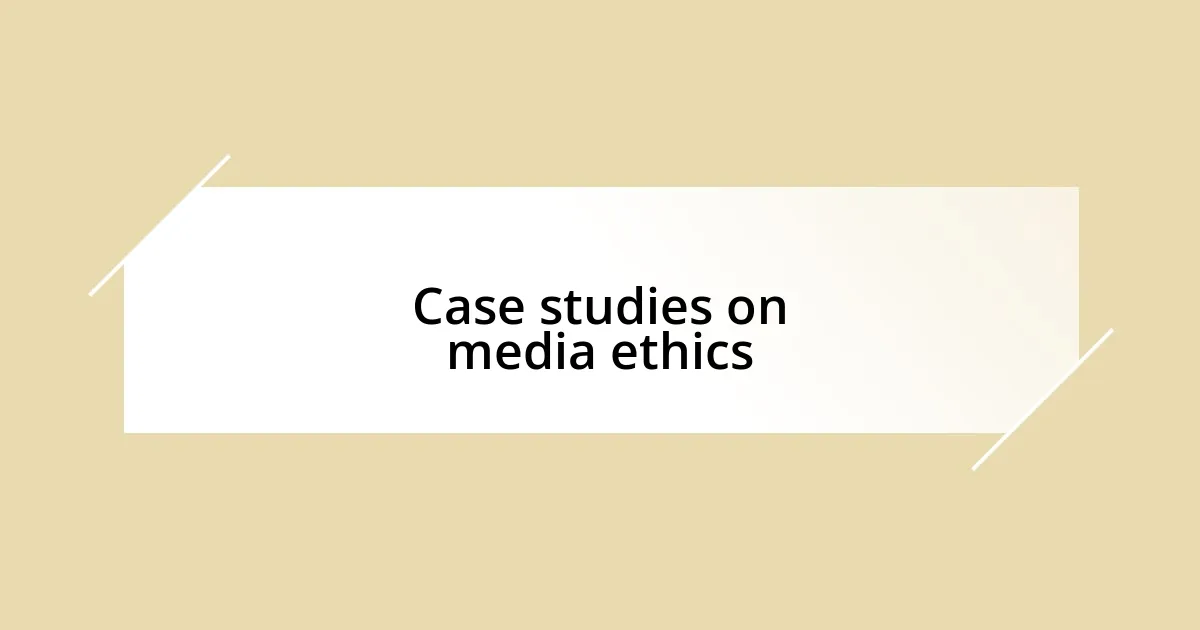
Case studies on media ethics
One of the most enlightening case studies in media ethics I encountered involved a major news outlet reporting on a public figure’s private life. During this situation, I was reminded of the chilling effect that invasive coverage can have. In my past work, I covered a similar story and faced the decision of whether to dive into personal details or respect the person’s right to a private life. Ultimately, I chose restraint, reflecting on how such decisions shape public perceptions and influence future journalists.
Another instance that stuck with me was the handling of a sensitive breaking news story about a community tragedy. A colleague felt compelled to report graphic details that ultimately overshadowed the human aspect of the event. I can’t help but think: How do we balance being truthful and respectful when the stakes are so high? This experience taught me the importance of reframing the narrative to focus on healing rather than sensationalism, highlighting the broader impact of our words on grieving communities.
Finally, I’ve seen first-hand the fallout from reporting inaccuracies in a high-stakes investigation. When a false claim was made about a local business, the repercussions extended far beyond a simple correction. The owner faced public backlash that threatened their livelihood. It drove home for me that every detail matters—journalists hold a powerful position that can either build or destroy lives. I often reflect on my responsibility to present not just the story but the truth behind it, understanding that our role carries profound ethical weight.
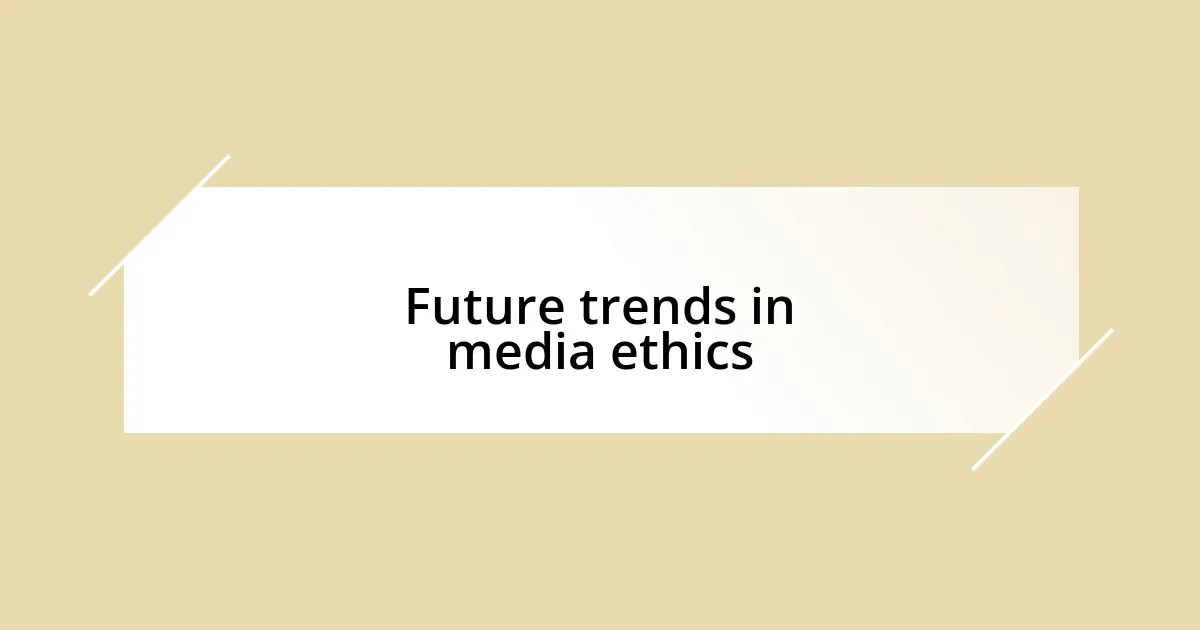
Future trends in media ethics
As I look into the future of media ethics, I can’t help but notice how rapidly advancing technology is reshaping our landscape. For instance, the proliferation of artificial intelligence in journalism raises urgent ethical questions. I remember a workshop where we discussed the implications of AI-generated content—could it blur the lines between credible reporting and misinformation? It’s a concern that has me wondering how we can keep the integrity of our stories intact amidst the convenience of technology.
Moreover, I see a growing emphasis on transparency. The public is becoming savvier and more demanding about knowing the sources and processes behind the news they consume. I recall a moment during a community forum where a member asked how decisions were made about which stories to cover. That honest inquiry made me realize that our audience craves not just information, but also insight into our ethical decision-making processes. This transparency will likely become a hallmark of responsible journalism in the coming years.
I also believe there will be a rising focus on inclusivity in media ethics. It’s not just about who tells the story, but also whose stories are told. Reflecting on my own experience covering diverse communities, I realized how vital it is to amplify marginalized voices. I often think, “Are we really representing the spectrum of human experience?” Embracing diverse perspectives will not only enhance the richness of reporting but also embody the ethical commitment we owe to our ever-evolving society.
